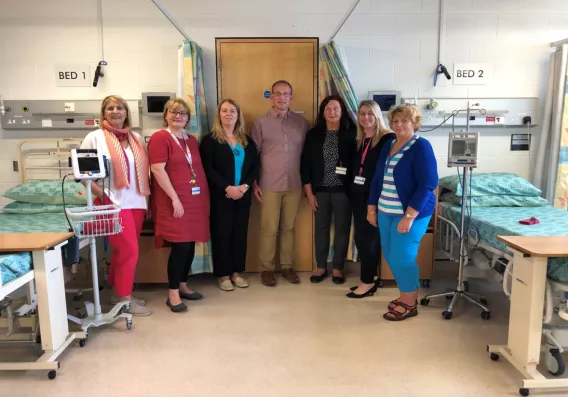
Simulation pedagogy is an important approach to teaching and learning in undergraduate nursing and midwifery education programmes. This Simulation in Nursing and Midwifery (SiNM) project focused on formalising simulation pedagogy into undergraduate nursing and midwifery curricula at the School of Nursing and Midwifery, University of Limerick. Please read below or watch the short video displayed (seven minutes) to learn more about our work in this field.
Please contact liz.kingston@ul.ie for further information.
The Simulation in Nursing and Midwifery (SiNM) initiative at the School of Nursing and Midwifery, University of Limerick, was supported by the National Forum for the Enhancement of Teaching and Learning in Higher Education. The project was funded through the Strategic Alignment of Teaching and Learning Enhancement (SATLE) Funding in Higher Education 2019. The aim of the project was to incorporate simulation pedagogy into year four of the BSc Nursing and BSc Midwifery programme curricula at the University. The goal was to support students in their transition to the clinical internship component of their BSc programmes by utilising this student-centred approach. A co-design and co-creation philosophy underpinned the initiative, and the team comprised academics, clinical service partners and undergraduate students across four programmes of study.
An experienced learning technologist in simulation was hired to coordinate the formal integration of simulation into the curriculum. Academic staff, including module leaders, were invited to participate in the project, and received training through workshops and seminars. A high-fidelity simulator was purchased to enhance the learning experience. The simulation learning technologist and module leaders collaboratively designed and planned several simulation-based learning experiences.
Despite challenges posed by the COVID-19 pandemic, fourteen simulation learning experiences were successfully delivered to 112 fourth-year students across four undergraduate programmes. This initiative significantly developed the faculty's capability, capacity, and opportunity to utilize simulation pedagogy in nursing and midwifery education. The student-centred, supportive learning environment fostered by this approach generated ongoing interest among both faculty and students. This has led to plans to further build capacity and sustain the use of simulation pedagogy in the future.
Impact
The integration of simulation pedagogy significantly transformed our curriculum teaching approaches, fostering a student-centred learning environment. This project led to increased student engagement in clinical skills education, as students actively prepared for simulation-based learning experiences. These simulations provided a safe environment where good practices were recognized, and poor practices could be addressed during supportive debriefing sessions.
The project also solidified the commitment of a core faculty team to support and expand simulation pedagogy within our school. Faculty confidence and capability in using simulation pedagogy were enhanced. Additionally, the project strengthened relationships with clinical service partners, who remain dedicated to building capacity and sustaining simulation pedagogy.
Building on the success of this project, we plan to implement simulation pedagogy more broadly across the BSc Nursing and BSc Midwifery programmes. This will offer a structured and supportive approach to teaching and learning clinical skills. Experienced lecturers and teachers within the school will provide peer support to those new to simulation pedagogy. Additionally, we are creating a shared repository of sustainable, reusable simulation resources and protocols that can be utilised across various modules and programmes.
Sustainability
Supported by the Strategic Alignment of Teaching and Learning Enhancement Funding in Higher Education 2020, we plan to elevate simulation pedagogy in the school from scoping to capacity building and sustainability. Our goals include:
- Broader Simulation Use: Incorporating simulation pedagogy across all four years of our school's undergraduate programmes.
- Capacity Building: Enhancing faculty engagement with simulation pedagogy through comprehensive training and technical support.
- Sustainable Resources: Developing a shared repository of reusable simulation resources to ensure long-term sustainability.
These initiatives aim to scale up the utilisation of simulation pedagogy, fostering a robust and supportive learning environment for both students and faculty.
Reflections
The learning technologist played a pivotal role in the project's success by providing essential support and guidance. This allowed lecturers the space and time to innovate and be creative in a safe, supportive environment, enhancing the initiative's sustainability and impact.
Students also made valuable contributions to the co-design and development of teaching and learning experiences. Their involvement significantly improved the design and fidelity of the simulated learning experiences. This co-creation philosophy was crucial for the initiative's sustainability and credibility.
Student participation in creating the simulated learning experiences led to greater buy-in and positive evaluations. In both written and verbal feedback, students expressed a desire for more simulated learning experiences, which positively influenced lecturers' perceptions of the initiative's value and impact.

Project Team Members (left to right): Liz Kingston, Mairead Moloney, Kathleen Markey, Owen Doody, Pauline Meskell, Louise Murphy, Anne Fahy
Meet the Team
Dr Liz Kingston, Project Lead
Ms Ann Fahy
Collaborators
Ms Suzanne Jackman, Clinical Skills Coordinator (Midwifery), University Maternity Hospital Limerick.
Ms Aileen Moloney, Clinical Placement Coordinator (General) St John Hospital, Limerick.
Ms Karina O’Sullivan, Nursing Practice Development Coordinator (Intellectual Disability), St. Vincent’s’ Centre Lisnagry, Limerick.
Mr Mark Johnson, Nursing Practice Development Coordinator (Mental Health), Practice Development Unit for Mental Health, HSE Mid-West, Limerick.

This project was funded by National Forum for the Enhancement of Teaching and Learning in Higher Education through the Strategic Alignment of Teaching and Learning Enhancement (SATLE) Funding in Higher Education 2019.
Value: €82,525
Contact School of Nursing and Midwifery
Health Sciences Building, North Bank Campus, University of Limerick
Email: nm@ul.ie